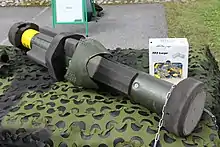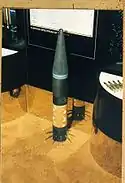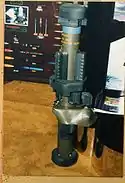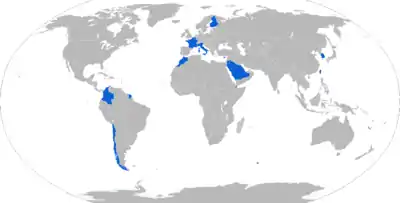APILAS
The RAC 112 APILAS, commonly designated APILAS (Armor-Piercing Infantry Light Arm System), is a portable one-shot 112 mm recoilless anti-tank weapon, designed in France by GIAT Industries. Over 120,000 of the APILAS launchers have been produced, and they are in service with many countries.
| APILAS | |
|---|---|
 The APILAS on display at the 2014 Flag Day event, sponsored by the Finnish military. | |
| Type | Anti-tank weapon |
| Place of origin | France |
| Service history | |
| In service | 1985-present |
| Used by | See Users |
| Wars | |
| Production history | |
| Designer | GIAT Industries |
| Manufacturer | GIAT Industries |
| Unit cost | €2,000 |
| Produced | 1985-2006 |
| No. built | 120,000 |
| Specifications | |
| Mass | 9 kg (19.84 lb) |
| Length | 1,300 mm (51.2 in) |
| Barrel length | 180 mm (7.1 in) |
| Caliber | 112 mm (4.4 in) |
| Muzzle velocity | 293 m/s (961 ft/s) |
| Effective firing range | 25–350 m |
| Maximum firing range | 500 m |


| External images | |
|---|---|
| APILAS - 1983 1st Version | |
Description
The APILAS is supplied in an aramid fibre launcher tube with a retractable sight. The effective range of APILAS is from 25 m (it takes 25 m for the rocket to arm itself) up to 300-500 m depending on the target. The shaped charge warhead is electrically fused and will detonate at impact angles up to 80 degrees.[4]
Although heavy, the APILAS is able to pierce 700 mm of RHA.[2] Within the French Army it is categorized as "traumatic weapon", because of its blast and noise. A French soldier cannot fire it more than 3 times in his service during peacetime.[5]
An off-route mine system was developed using the APILAS rocket mounted on a tripod using a sensor package, or tripwires.
Production
84,000 were ordered in 1984 by the French Army to replace the LRAC F1 until the adoption of the ERYX short-range missile.[5] The French company Matra Manurhin Défense (now NEXTER - ex GIAT) produced 120,000 APILAS between 1985 and 2006.[6]
Specifications
- Calibre: 112 mm
- Length
- Launcher:
- Transportation: 1290 mm
- Fire-ready: 1260 mm
- Projectile: 920 mm
- Launcher:
- Weight:
- Overall: 9.0 kg
- Projectile: 4.3 kg
- Launcher: 4.7 kg
- Range: 25 m to 300 m + (moving target) 500 m + (static target)
- Engine: Solid-fuel rocket
- Muzzle velocity: 293 m/s
- Time of flight to 500 m: 1.9 s
- Warhead: 1.5 kg shaped charge capable of penetrating 720 mm RHAe or 2 m of concrete
- Trigger: Piezoelectric sensor with 50g black powder
Operators

References
- Rottman, Gordon L. (1993). Armies of the Gulf War. Elite 45. Osprey Publishing. pp. 58-59. ISBN 9781855322776.
- Jenzen-Jones, N.R. (8 September 2015). "French APILAS anti-tank weapon in Syria". armamentresearch.com.
- the first versions did not have the gunner's face mask, but was added later due to unburn propellant after the projectile left the tube
- Gander, Terry J. (2001). "Giat Industries APILAS light anti-tank weapon". Jane's Infantry Weapons 2002–2003. pp. 1790–1791.
- "ROQUETTE ANTICHAR DE 112 mm appelée également " RAC 112 APILAS "". musee-infanterie.com (in French). Archived from the original on 3 August 2016. Retrieved 12 December 2018.
- "Nous sommes fiers de – Lance-roquette anti-char APILAS" [We are proud of – APILAS anti-tank rocket launcher]. manurhin-group.com (in French).
- Darcourt, Pierre (January 1984). "Tchad: le désert des Tartares". La Gazette des armes (in French). No. 125. pp. 16–19.
- The Military Balance 2009. Routledge. January 26, 2009. pp. 173, 264, 293. ISBN 9780415498463.
Sources
- Jane's Infantry Weapons 2005–2006
- Jane's Mines and Mine Clearance 2005–2006
| Wikimedia Commons has media related to Apilas. |